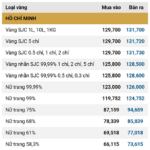Leading Vietnamese gold and jewelry companies, including SJC, Bao Tin Minh Chau, and DOJI, have maintained their SJC gold bar prices at VND 132.5 – 134.5 million per tael (buy-sell), unchanged from the previous day.
Other gold traders uniformly listed the selling price of SJC gold bars at VND 134.5 million per tael.

SJC gold bar buying prices vary among retailers.
However, buying prices differ significantly. Mi Hong Gold offers the highest market purchase rate at VND 133.5 million per tael, while Phu Quy Jewelry Group quotes the lowest at VND 132 million per tael.
Ring gold prices vary across brands, with a consistent VND 3 million per tael buy-sell spread. Bao Tin Minh Chau lists ring gold at VND 129 – 132 million per tael, while Phu Quy Jewelry Group quotes VND 128.5 – 131.5 million per tael.
Globally, gold prices reached $3,761/ounce, a $19 increase. Domestic prices remain approximately VND 15 million per tael higher than international rates.
The State Bank set the central exchange rate at VND 25,186/USD, unchanged. Commercial banks trade USD at VND 26,195 – 26,445 (buy-sell).
Black market USD rates range from VND 26,490 – 26,590.
Afternoon of September 18: SJC Gold Bars and Ring Prices Continue to Plummet
In the early hours of September 18th, global gold prices surged dramatically, reaching an all-time high of over $3,700 per ounce. However, this rally was short-lived as prices abruptly reversed and plummeted. Domestically, the opening of the market saw a similar trend, with both SJC gold bars and gold jewelry prices experiencing a widespread decline.
Gold Prices Plummet Following Trump’s Election Victory
The global gold price plunge has dragged the price of 99.99% gold rings below the 88 million VND per tael mark.



















